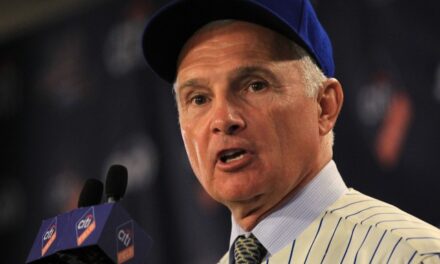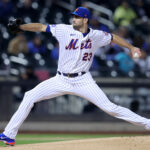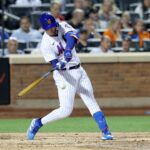
As Major League Baseball heads towards a new CBA following the 2021 season, a hot button issue is whether or not the National League should adopt the Designated Hitter, making it universal and opening several other doors for MLB.
There has been debate over the Designated Hitter for quite some time now, but this is the most traction there ever has been to get it done. Hall of Fame writer Jayson Stark has spent his career on the Philadelphia Phillies’ beat, writing on a national scale, and as an on-air talent for ESPN.
Stark is one of the leading voices on the debate over the Designated Hitter and we thank him for taking the time out of his day to speak with MetsMerized about the idea of implementing a universal DH.
MMO: How strong is the push for a DH in the National League?
Stark: I’m not sure “push” is the way to describe it. But I think it’s fair to say there has never been more support inside National League front offices for a universal DH, at least not since I’ve been covering baseball.
MMO: Why is there a push for a National League DH when NL teams have better attendance and ratings?
Stark: Again, I don’t think there is necessarily a “push.” But I think the reasons start with this, at least in NL front offices: Say you’re a National League team and you’re trying to sign or trade for a marquee hitter – a Bryce Harper, a Manny Machado, even a Josh Donaldson. You recognize going in that an American League team competing for the same hitter has a built-in advantage because of the DH.
If that hitter reaches his mid-30s and turns into Miguel Cabrera, where his legs just aren’t healthy enough to allow him to play the field every day, the AL team has a DH spot to fall back on. If you don’t have a DH slot as an option, what do you do? Trade him? Release him? Just eat the money? Eating money isn’t any front office’s favorite thing!
MMO: Do you think National League teams will now be proactive in finding prospects they can groom into DH’s versus having them continue to try to develop defensively?
Stark: I actually see the opposite. I think the trend is no longer to have a “regular,” Big Papi-type DH. For most teams, it’s become more of a revolving spot to get a guy a quasi-rest but still keeping his bat in the lineup. Did you know there were only two players in baseball who got 500 plate appearances as a DH last year? (Khris Davis and Nelson Cruz.)
There were only three others who even got 300 plate appearances – and one of them (Shohei Ohtani) was coming off Tommy John Surgery so he literally couldn’t play the field. That’s telling us something about the way the DH is evolving.
MMO: How much support does the MLBPA offer for a National League DH?
Stark: Heavily in favor! When the labor talks come to a head in two years, that will be something the union will push for.

MMO: How does a universal DH affect the chances of MLB expanding its number of teams?
Stark: If we’re playing the cause/effect game, the universal DH wouldn’t “cause” expansion. But they’re related in this way: If MLB expands, it would like to do a geographical realignment that would blur the traditional definition of an “AL team” and an “NL team.”
So it would make sense to blend the universal DH into that scenario, since you could have several longtime NL teams moving to the American League – or you might not even have an American League and National League anymore. It could be the Eastern and Western Leagues, with the Northeast Division, etc.
MMO: How strong is player support for the DH in the National League?
Stark: I mentioned earlier than the union is heavily in favor. That’s because players, in general, are in favor – with the exception of the Madison Bumgarner‘s of the world who still love to hit.
MMO: What team(s) do you believe would be most affected by having a DH at their disposal?
Stark: We’re enough years away from this actually happening that it’s impossible to say. But here’s an example: Maybe the Padres don’t trade a below-average defender like Franmil Reyes if there’s a DH in the National League because they wouldn’t be forced to play him in the field to keep his bat in the lineup every night.
MMO: How likely is it we see a team opt to not use the DH in a game in favor of a strong hitting pitcher, say a Madison Bumgarner or Jake Arrieta?
Stark: That wouldn’t happen! To my knowledge, since interleague play came along more than two decades ago, there has only been one instance of an NL team going into an AL park and letting the pitcher hit instead of using the DH. That was Bruce Bochy letting MadBum hit a few years ago when he was especially hot at the plate. But even that was only one game. Just don’t see it happening – even when somebody like Ohtani is pitching.
MMO: Are you in favor of the DH being implemented in the National League? Why?
Stark: I’ve always preferred “National League style baseball.” But if you look closely, that style is vanishing already. The running game, intentional walk, etc. is declining at historic levels. So there’s not as much to preserve as there used to be. For that reason, I’m more open-minded on this than I’ve ever been.
MMO: You have given your take on how to implement the DH in the National League saying, “How about a rule that would allow teams to use their DH only as long as their starting pitcher remained in the game? Then, once the starting pitcher exited, that game would revert to old-school rules.”
Why do you think this rule would be better than a straightforward DH, as is in the American League?
Stark: It’s fun! It provides a lot of the benefits of the universal DH – one of them being that starting pitchers would never hit, reducing injury risk – but it preserves the late-game strategy questions that make non-DH baseball so interesting. Second-guessing those tough managerial decisions is part of what makes baseball great. This would keep that alive.
Do you leave your starter in longer to preserve the DH? Do you switch your DH into the field late in the game? I really like that twist, and I know it’s been kicked around inside the sport. The more I think about it, the more I like it!















